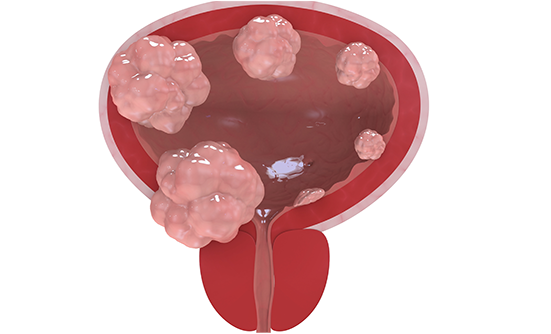The bladder is where the urine is stored before it leaves the body. Bladder cancer occurs when cells in the urinary bladder grow uncontrollably, sometimes forming tumors and spreading to other parts of the body. According to the American Cancer Society, approximately 76,960 new cases of bladder cancer will be diagnosed in 2016 in the United States. Men are 3 to 4 times more likely than women to have bladder cancer.
Types of Bladder Cancer
Several types of cancer can start in the bladder. Urothelial carcinoma is the most common type and includes 95% of all bladder cancers. Urothelial carcinoma includes 2 types—papillary carcinoma and flat carcinoma.
The other 5% of bladder cancers include squamous-cell carcinoma, adenocarcinoma, small-cell carcinoma, and sarcoma.
Risk Factors
The risk factors for bladder cancer are divided into 2 categories: those you can change and those you can’t. Knowing about these risk factors may help you lower your risk.
Risk factors that you cannot change are being white, male, and getting older, as well as having a personal or family history of bladder cancer, chronic bladder irritation, bladder birth defects, and chemotherapy or radiation.
The risk factors you can control to reduce your risk for bladder cancer include:
- Smoking: people who smoke are 3 times more likely to get bladder cancer than other people
- Workplace exposure to certain chemicals: smokers who work with cancer-causing chemicals have an especially high risk
- Certain drugs or herbal supplements: examples include using the diabetes drug Actos (pioglitazone) for more than 1 year, and dietary supplements containing aristolochic acid
- Arsenic in drinking water
- Not drinking enough fluids
Get to Know the Symptoms
Bladder cancer is often found early, because it causes blood in the urine and other urinary symptoms. Although some symptoms may be caused by other conditions, such as a urinary tract infection or bladder stones, it is important to check them. The common symptoms of early-stage bladder cancer are:
- Blood in urine is usually the first sign, and may be sporadic
- Frequent urination and pain or burning during urination
- Feeling of needing to urinate urgently even if your bladder is not full
- Difficulty urinating or a weak urine stream
The symptoms of advanced-stage bladder cancer include inability to urinate; lower back pain on one side; loss of appetite and weight; weakness and fatigue; swollen feet; and bone pain.
Diagnosis and Screening
Early diagnosis improves the chances of recovery, so if you have any symptoms, have them checked by your doctor.
Routine screening for bladder cancer is generally not recommended; however, high-risk people may be screened, including those who have had bladder cancer, have birth defects of the bladder, or have been exposed to certain work chemicals.
Screening tests include urinalysis to check for blood in urine; urine cytology, which uses a microscope to find cancer cells in the urine; and a urine test to look for tumor markers that may indicate bladder cancer.
Treatment Options
Treatment options for patients with bladder cancer depend on the stage of the cancer, and typically include radiation, chemotherapy, immunotherapy, and surgery.
Surgery to remove tumors in the bladder is usually an option for early-stage bladder cancer, but new tumors can reappear in other parts of the bladder. Therefore, some patients may have their whole bladder removed.
Radiation therapy is used to kill cancer cells. Radiation therapy can be used after surgery that doesn’t remove the whole bladder, as the main treatment for early-stage disease in patients who cannot undergo surgery, as initial treatment for advanced bladder cancer, and for treating the symptoms of advanced bladder cancer.
Chemotherapy can be given directly into the bladder, taken orally as a pill, or injected into the vein. When given with radiation, the most common chemotherapy drugs include cisplatin, cisplatin plus fluorouracil, and mitomycin plus fluorouracil.
The most common chemotherapy drugs given without radiation include gemcitabine and cisplatin; methotrexate, vinblastine, doxorubicin, and cisplatin; cisplatin, methotrexate, and vinblastine; and carboplatin with either paclitaxel or docetaxel.
First Immunotherapy for Bladder Cancer
Immunotherapy is a type of drug that uses the person’s immune system to allow the body’s immune cells to fight the cancer cells.
In May 2016, the FDA approved Tecentriq (atezolizumab), the first immunotherapy drug for patients with advanced bladder cancer. Tecentriq is used in patients whose disease continues to grow after chemotherapy. It is the first new drug to become available for bladder cancer in more than 30 years.
In clinical trials, Tecentriq stopped the growth of tumors in 24% of patients with advanced bladder cancer and reduced the size of the tumor by 30%. Tecentriq targets the PD-L1 protein, which is located on the surface of cancer cells and prevents the immune system from attacking them. By blocking PD-L1, Tecentriq shrinks the tumor and slows its growth. Therefore, Tecentriq is particularly beneficial in patients with bladder cancer and high PD-L1 levels. Tecentriq is intended for use after testing for PD-L1 in the patient to determine if this drug will be helpful.
Patient Resources
American Cancer Society
www.cancer.org/cancer/bladdercancer/index
Cancer.net
www.cancer.net/cancer-types/bladder-cancer
Urology Care Foundation
www.urologyhealth.org/urologic-conditions/bladder-cancer














